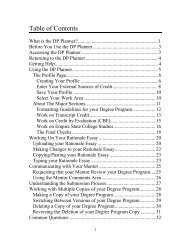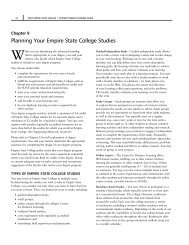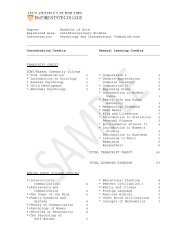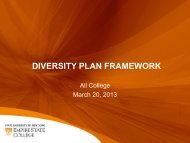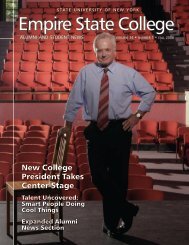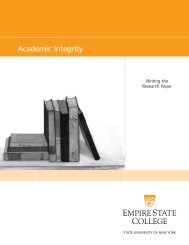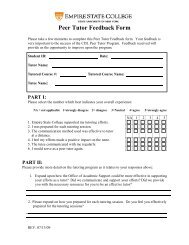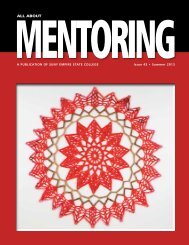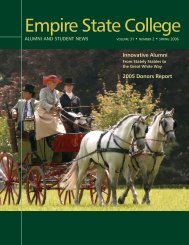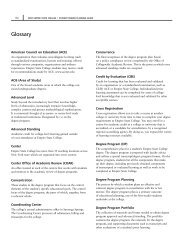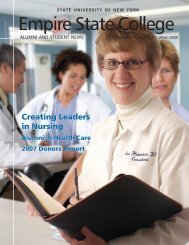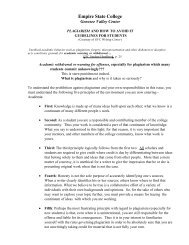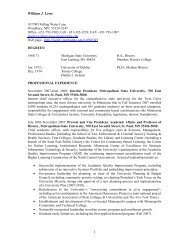Academic Plan 2011-2015 (PDF 524kB) - SUNY Empire State College
Academic Plan 2011-2015 (PDF 524kB) - SUNY Empire State College
Academic Plan 2011-2015 (PDF 524kB) - SUNY Empire State College
You also want an ePaper? Increase the reach of your titles
YUMPU automatically turns print PDFs into web optimized ePapers that Google loves.
<strong>SUNY</strong> <strong>Empire</strong> <strong>State</strong> <strong>College</strong>: <strong>Academic</strong> <strong>Plan</strong> <strong>2011</strong> - <strong>2015</strong> 11• <strong>College</strong>wide Residencies, Faculty Institutes and Other <strong>Academic</strong> Initiatives: Groups of facultyaround the college also develop residencies for students across the college. <strong>College</strong> approval forthese learning experiences is provided by the Office of <strong>Academic</strong> Affairs. Faculty also may clusterinto affinity groups, or propose other academic initiatives within or across areas of study.• Sample Degrees: Sample degrees formalized in agreements or posted in materials aredeveloped by faculty and approved by deans and OCAR.• Center for Distance Learning, The Harry Van Arsdale Jr. Center for Labor Studies, Center forInternational Programs and School for Graduate Studies: Some educational centers developmore structured degree programs. There is greater attention to curricular coherence withinthese offerings, and the responsibility for planning these initiatives lies with faculty committees,associate deans and deans.• Areas of Study, New Degrees, Certificates: The existing subcommittee of the Committeeon Undergraduate Studies and Policies (CUSP) responsible for program assessment (CUSP-PA) should become a standing governance committee charged with the review of newundergraduate AOS proposals (or significant revisions), undergraduate certificate proposalsand the college’s approach to program outcomes assessment at the undergraduate level.Membership should include representatives from each area of study, as well as representativesfrom the directors of academic review (DAR) and from the directors of academic support (DAS).The Graduate Studies and Policies Committee (GSPC) will continue to serve this purpose at thegraduate level. Issues of overlap and joint responsibility should be reviewed and coordinatedbetween these committees where appropriate. The provost/vice president for academic affairsalso will seek input on academic program initiatives from deans and faculty chairs, recognizingthe value of input from the educational centers of the college. CUSP will retain responsibility forundergraduate academic policies.New degree certificates, programs and partnershipsCertificatesExternal scanning indicates that adult learners, particularly in these economic times, may be interestedin shorter programs, such as certificates or other milestones on the way to the degree (see Eduventuresresearch, stackable certificates from Massachusetts and Ohio). While recent efforts to advancecertificates have predominantly focused on the graduate level, the academic plan endorses thedevelopment of academic certificates at the undergraduate level.Professional doctoratesA specific need at the graduate level relating to the lack of professional doctorates in the state of NewYork has been identified. Scanning has indicated that many adults in New York state are going out ofstate or to private institutions to pursue these degrees. The <strong>Academic</strong> <strong>Plan</strong>ning Task Force supportsthe exploratory work currently underway to pursue collaborative degrees with other institutions withspecific identified audiences.



